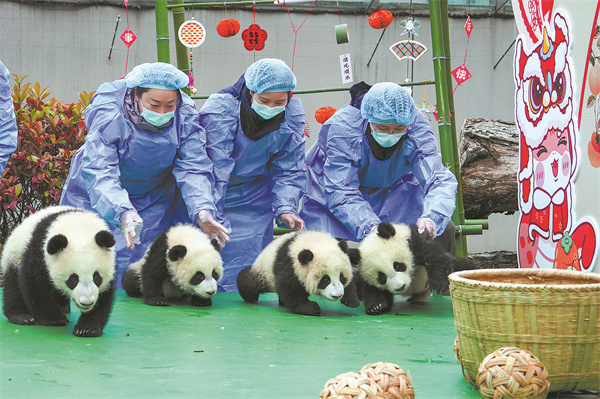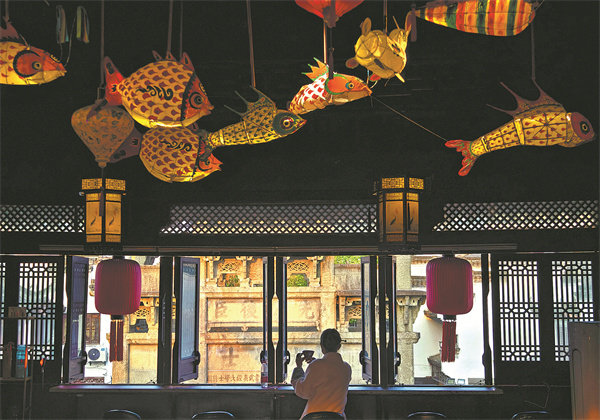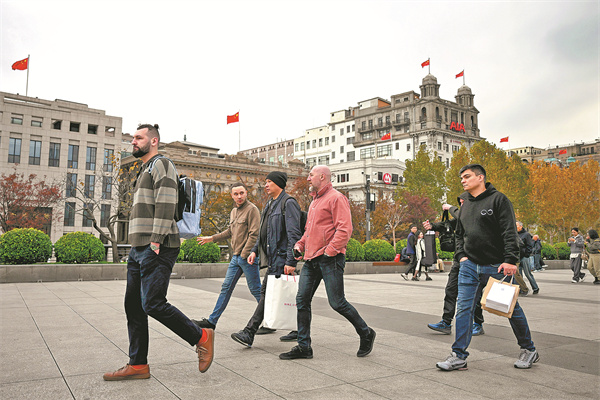An increasing number of Russian tourists crave immersive cultural experiences when visiting China, Yang Feiyue reports.

The number of Russian travelers visiting China has not only rebounded from pandemic-era lows but has fundamentally transformed, with tourists increasingly trading organized tours for immersive cultural experiences.
The southern island of Hainan's idyllic tropical climate, breathtaking coastal scenery, high-quality wellness services, and visa-free access have cemented its status as a favorite getaway for Russian travelers.
According to local authorities, Hainan province welcomed 178,000 Russian visitors in 2024, an elevenfold increase compared to the previous year.
But the tourism boom extends far beyond Hainan's shores.
The Association of Tour Operators of Russia reports that 1.8 million Russian visitors made their way to China last year, a 96.5 percent increase year-on-year.
ALSO READ: China, Russia foster green partnership
Li Xiaoying has been receiving Russian tourists to China for over two decades and noticed a significant shift from large, organized tours to independent, culturally immersive trips.
"There has been a 50 percent year-on-year increase in independent Russian travelers, primarily families and small groups of friends," says Li, head of the Beijing Zhentu International Travel Agency's operations in the city's Central Business District.
Before the pandemic, Russian tourists typically arrived in large groups of 15-20 people, sticking to classic itineraries covering Beijing, Shanghai, and Xi'an in Shaanxi province.

Today, they're venturing deeper into China, with Zhangjiajie of Hunan province, Guilin of the Guangxi Zhuang autonomous region, and Huangshan of Anhui province emerging as new hot spots.
"Russian tourists no longer want to just see the Great Wall," Li notes.
"They crave hands-on cultural experiences: writing calligraphy in a Beijing hutong, making dumplings with locals, or watching intangible cultural heritage performances," she adds.
The number of Russian travelers to China is projected to grow by 20 percent this year, according to Maya Lomidze, executive director of the Association of Tour Operators of Russia.
READ MORE: China-Russia bilateral trade poised for steady growth
Recently speaking on a Russian TV program, Lomidze attributes the surge to multiple factors, including restored flight connectivity nearing pre-pandemic levels and low baseline comparisons following COVIDera travel restrictions.
Aviation capacity between the two nations continues to rebound, with at least 170 weekly flights currently operating between Russian and Chinese cities, according to Russia's Federal Air Transport Agency.
For Surana Radnaeva, a Russian entrepreneur and founder of legal consultancy SinoRuss, China is more than a business destination; it's an endless source of surprise and joy.
Her most recent trip in February took her from downtown Beijing's ancient hutong and AI-powered innovations in the capital city's Zhongguancun area to Shanghai's futuristic skyline, with stops to admire Tianjin's architectural wonders.

"China is like a book you can never finish reading," Radnaeva says, adding that it's a sense of harmony that continues to draw her back.
"Where else can you attend morning tai chi sessions in a 600-year-old temple, negotiate deals over AI-powered translation systems at lunch, and ride a 350-kilometer-per-hour train to your next meeting?"
Over the years, Radnaeva has noticed a significant improvement in flights and railways connecting China and Russia.
She's also impressed by the domestic high-speed railway that enables her to enjoy breakfast in Beijing and dinner in Xi'an.

Radnaeva is in the process of writing a book that decodes Chinese business culture for Russians.
"It's important to search for regional specialties, whether Tianjin's fried dough twists or Yunnan province's mushroom hot pot. Food is China's universal language," she recommends to her compatriots.
Radnaeva is looking forward to visiting Xi'an later this year.
ALSO READ: Sino-Russian cooperation beyond energy
"Every Russian knows about the Terracotta Warriors," she says, adding that she will also explore local night markets and Tang Dynasty (618-907) poetry readings.
Irina Antonova, a senior executive at Russian Tour, notes that China's high development rate offers comfortable leisure and travel experiences, which have driven more Russians to explore the country.

"They are interested in seeing China's development," Antonova says.
The profound history of Beijing and Xi'an, the modernity of Shanghai and Hong Kong, beach holidays in Hainan, and pandas in Sichuan province, along with the river and mountain landscapes in Guilin, are among the most popular with Russian travelers, she observes.
To cater to this demand, Li Xiaoying's agency has developed small-group "culture-plus-scenery" tours, blending sightseeing with activities like tea ceremonies and traditional crafting.
Li owes China's rising popularity with Russian travelers to word-of-mouth recommendations and China's active promotion of tourism in Russia.
READ MORE: Foreign visitors impressed by easier sales tax refunds
"Social media has fueled demand, and every returning traveler becomes an ambassador," Li says.
Destinations like Hunan have also staged multiple tourism events in Russia, which endeared themselves to Russian travelers, she adds.
Li expects sustained growth in high-quality, experience-driven tourism from Russia over the next five years.
"All travel operators need to do is to help them experience China like a local, not just see it," Li says.


